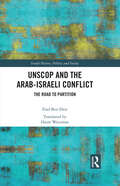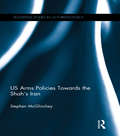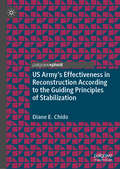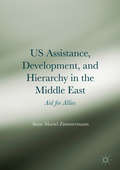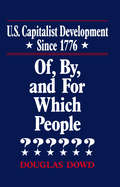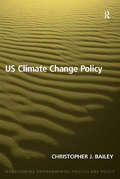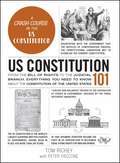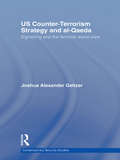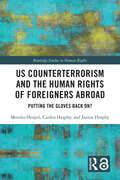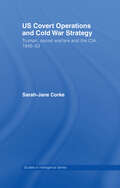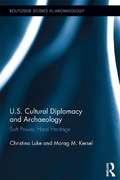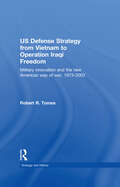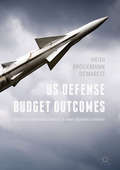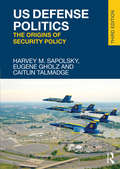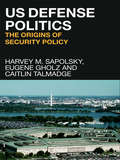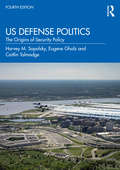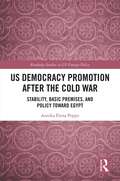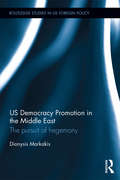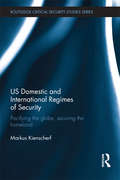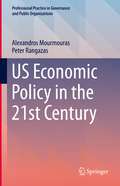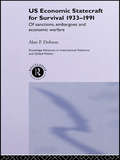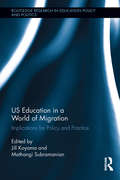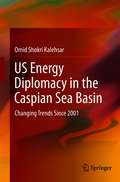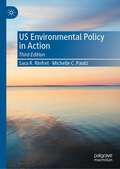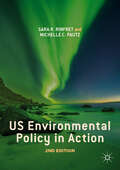- Table View
- List View
UNSCOP and the Arab-Israeli Conflict: The Road to Partition (Israeli History, Politics and Society)
by Elad Ben-DrorThis book provides the first comprehensive account of the work of the United Nations Special Committee on Palestine (UNSCOP), constituted by the United Nations General Assembly in 1947 to study the situation in Palestine at the end of the British Mandate and make recommendations about its political future. Utilizing a wealth of archival documentation, some of it never before studied, Elad Ben-Dror explores the various aspects of UNSCOP’s activity to understand how they came to determine the fate of the country’s inhabitants. The book analyses the methods and motivations of the various members, with special attention given to the personal viewpoint of each member of the committee. Through this Ben-Dror shows that the partition recommendation emerged after a long process of study, debate, and compromise that was very much dependent on the characters and circumstances of the individual members of the committee. UNSCOP and the Arab-Israeli Conflict will be a key text in understanding the role of UNSCOP in shaping the modern Middle East. It will be appropriate for scholars and students of political science, Palestine and Israeli history, the Arab-Israeli conflict, the UN and diplomacy, and conflict resolution.
US Arms Policies Towards the Shah's Iran (Routledge Studies in US Foreign Policy)
by Stephen McGlincheyThis book reconstructs and explains the arms relationship that successive U.S. administrations developed with the Shah of Iran between 1950 and 1979. This relationship has generally been neglected in the extant literature leading to a series of omissions and distortions in the historical record. By detailing how and why Iran transitioned from a primitive military aid recipient in the 1950s to America’s primary military credit customer in the late 1960s and 1970s, this book provides a detailed and original contribution to the understanding of a key Cold War episode in U.S. foreign policy. By drawing on extensive declassified documents from more than 10 archives, the investigation demonstrates not only the importance of the arms relationship but also how it reflected, and contributed to, the wider evolution of U.S.-Iranian relations from a position of Iranian client state dependency to a situation where the U.S. became heavily leveraged to the Shah for protection of the Gulf and beyond – until the policy met its disastrous end in 1979 as an antithetical regime took power in Iran. This book will be of interest to students and scholars of Middle East studies, US Foreign Policy and Security studies and for those seeking better foundations for which to gain an understanding of U.S. foreign policy in the final decade of the Cold War, and beyond.
US Army's Effectiveness in Reconstruction According to the Guiding Principles of Stabilization
by Diane E. ChidoThis book breaks down the outcomes of stabilization operations including those related to establishing or enhancing safety and security, institutions of governance, rule of law, social well-being, economic development, access to education and health care, infrastructure development, reducing corruption and all the associated elements for shoring up fragile communities. These are analyzed through the unusual lens of the US post-Civil War case of Reconstruction, and lessons are identified for improving outcomes for future stabilization missions. The book is designed to be accessible to military advisors, international development professionals, students, policymakers and planners, and all who are involved in peacebuilding in the field, not only in the ivory tower.
US Assistance, Development, and Hierarchy in the Middle East
by Anne Mariel ZimmermannWhat does US aid "buy" in the Middle East? Drawing on extensive primary source research, this book examines the role and consequences of US aid to three countries in the Middle East. The author argues that the political survival strategies of incumbent leaders in Egypt, Israel, and Jordan shaped not only the type of aid that these countries received from the US, but also its developmental and geopolitical impact. Leaders who relied heavily on distributing selective benefits to their ruling coalitions were more likely to receive forms of US aid that complemented their distributive political economies and undermined the state's developmental capacity, which simultaneously rendered them more dependent on US resources, and more likely to cede fragments of their sovereignty to their major donor. Non-distributive leaders, however, could reap the full benefits of highly discretionary and technologically sophisticated aid, incorporating it into developmental policies that rendered them progressively less dependent on Washington--and better able to say "no" when it was in their best interest.
US Capitalist Development Since 1776: Of, by and for Which People?
by Douglas DowdFirst Published in 1994. Routledge is an imprint of Taylor & Francis, an Informa company.
US Climate Change Policy (Transforming Environmental Politics and Policy)
by Christopher J. BaileyThe United States is often perceived as sceptical, if not hostile, to the need to address man-made climate change. US government policy has undoubtedly disappointed environmentalists and scientists who believe more concerted action is needed, but a careful examination of the evidence reveals a number of policy actions designed to investigate, mitigate, and adapt to climate change have been implemented. Laws, regulatory action, and court rulings have led to advances in climate science, action to reduce levels of greenhouse gas emissions and efforts to prepare for the potential consequences of climate change. In this important book Chris Bailey explains and details the challenges and achievements of US climate change policy from its origins to the present day.
US Constitution 101: From the Bill of Rights to the Judicial Branch, Everything You Need to Know about the Constitution of the United States (Adams 101 Series)
by Tom Richey Peter PacconeUnderstand the foundation, principles, and rights that govern the United States with this vital, unbiased, and comprehensive primer to the US Constitution.With the Constitution being invoked more and more in American politics, it&’s now more important than ever before that you understand the guiding principles and significance of the document that shaped American democracy. Written well over 200 years ago, the United States Constitution has endured the test of time and remains the document that defines federal law and policy in the United States. US Constitution 101 explores the construction of the American government as it was laid out in the Constitution, delving into the rights and liberties granted and protected by the document through a detailed examination of each Article and Amendment. From the Preamble to the 27th Amendment, this primer is packed with information about the document that has defined the American political and judicial systems for more than two centuries. So, whether you&’re looking for deeper knowledge about the rights and responsibilities of American citizenship, or just want to better understand the foundations of American democracy, US Constitution 101 has all the answers—even the ones you didn&’t know you were looking for.
US Counter-Terrorism Strategy and al-Qaeda: Signalling and the Terrorist World-View (Contemporary Security Studies)
by Joshua A. GeltzerThis book examines the communicative aspects and implications of US counter-terrorist policies towards al-Qaeda. Recent US counter-terrorist strategy has been largely based upon projecting certain perceptions of America as an actor to those drawn to al-Qaeda, and this book investigates in what ways, and to what extent, US officials believed that the signals sent by what America did and said could influence the behaviour of the terrorist and would-be terrorist. The study then draws on a growing understanding of that audience to analyse how those drawn to al-Qaeda were and, indeed, still are likely to be influenced by the perceptions of America that Washington's policies generated. The study's central argument is that, given al-Qaeda's unconventional strategy and the particularities of the world-view characterising those drawn to the group, America's counter-terrorist signalling proved largely counter-productive to America's objective of undermining al-Qaeda's strategic narrative, instead serving in many ways to validate it. Firstly, this book seeks to reveal the significant and largely unexplored role that signalling has played in US counter-terrorist policy towards al-Qaeda. Second, it tries to capture the objectives, strategy, tactics, ideology, and other defining features of the world-view characterising those drawn to al-Qaeda. Third, it strives to combine those two lines of inquiry by applying the al-Qaeda world-view to a critical analysis of the signals sent by US policies. Finally, the book aims to offer broad policy implications that demonstrate how an informed understanding of the world-view of those drawn to al-Qaeda can be employed to revise and refine American counter-terrorist signalling. This book will be of much interest to students of US foreign policy and public diplomacy, counter-terrorism, strategy and international security. Joshua Alexander Geltzer has a PhD in War Studies from Kings College London, and is currently a juris doctoral student at Yale Law School.
US Counterterrorism and the Human Rights of Foreigners Abroad: Putting the Gloves Back On? (Routledge Studies in Human Rights)
by Monika Heupel Caiden Heaphy Janina HeaphyThis book examines why the United States has introduced safeguards that are designed to prevent their counterterrorism policies from causing harm to non-US citizens beyond US territory. It investigates what made US policymakers take steps to "put the gloves back on" through five case studies on the emergence of such safeguards related to the right not to be tortured, the right not to be arbitrarily detained, the right to life (in connection with targeted killing operations), the right to seek asylum (in connection with refugee resettlement), and the right to privacy (in connection with foreign mass surveillance). The book exposes two mechanisms – coercion and strategic learning – which explain why the United States has introduced what the authors refer to as "extraterritorial human rights safeguards", thus demonstrating that the emerging norm that states have human rights obligations towards foreigners beyond their borders constrains policy choices. This book will be of key interest to scholars and students of human rights, counterterrorism, US foreign policy, human rights law, and more broadly to political science and international relations.
US Covert Operations and Cold War Strategy: Truman, Secret Warfare and the CIA, 1945-53 (Studies in Intelligence)
by Sarah-Jane CorkeBased on recently declassified documents, this book provides the first examination of the Truman Administration’s decision to employ covert operations in the Cold War. Although covert operations were an integral part of America’s arsenal during the late 1940s and early 1950s, the majority of these operations were ill conceived, unrealistic and ultimately doomed to failure. In this volume, the author looks at three central questions: Why were these types of operations adopted? Why were they conducted in such a haphazard manner? And, why, once it became clear that they were not working, did the administration fail to abandon them? The book argues that the Truman Administration was unable to reconcile policy, strategy and operations successfully, and to agree on a consistent course of action for waging the Cold War. This ensured that they wasted time and effort, money and manpower on covert operations designed to challenge Soviet hegemony, which had little or no real chance of success. US Covert Operations and Cold War Strategy will be of great interest to students of US foreign policy, Cold War history, intelligence and international history in general.
US Cultural Diplomacy and Archaeology: Soft Power, Hard Heritage (Routledge Studies in Archaeology)
by Christina Luke Morag KerselArchaeology’s links to international relations are well known: launching and sustaining international expeditions requires the honed diplomatic skills of ambassadors. U.S. foreign policy depends on archaeologists to foster mutual understanding, mend fences, and build bridges. This book explores how international partnerships inherent in archaeological legal instruments and policies, especially involvement with major U.S. museums, contribute to the underlying principles of U.S. cultural diplomacy. Archaeology forms a critical part of the U.S. State Department’s diplomatic toolkit. Many, if not all, current U.S.-sponsored and directed archaeological projects operate within U.S. diplomatic agendas. U.S. Cultural Diplomacy and Archaeology is the first book to evaluate museums and their roles in presenting the past at national and international levels, contextualizing the practical and diplomatic processes of archaeological research within the realm of cultural heritage. Drawing from analyses and discussion of several U.S. governmental agencies’ treatment of international cultural heritage and its funding, the history of diplomacy-entangled research centers abroad, and the necessity of archaeologists' involvement in diplomatic processes, this seminal work has implications for the fields of cultural heritage, anthropology, archaeology, museum studies, international relations, law, and policy studies.
US Defence Strategy from Vietnam to Operation Iraqi Freedom: Military Innovation and the New American War of War, 1973-2003 (Strategy and History)
by Robert R. TomesUS Defence Strategy from Vietnam to Operation Iraqi Freedom examines the thirty-year transformation in American military thought and defence strategy that spanned from 1973 through 2003. During these three decades, new technology and operational practices helped form what observers dubbed a 'Revolution in Military Affairs' in the 1990s and a 'New American Way of War' in the 2000s. Robert R. Tomes tells for the first time the story of how innovative approaches to solving battlefield challenges gave rise to non-nuclear strategic strike, the quest to apply information technology to offset Soviet military advantages, and the rise of 'decisive operations' in American military strategy. He details an innovation process that began in the shadow of Vietnam, matured in the 1980s as Pentagon planners sought an integrated nuclear-conventional deterrent, and culminated with battles fought during blinding sandstorms on the road to Baghdad in 2003. An important contribution to military innovation studies, the book also presents an innovation framework applicable to current defence transformation efforts. This book will be of much interest to students of strategic studies, US defence policy and US politics in general.
US Defense Budget Outcomes
by Heidi Brockmann DemarestThis book offers a systematic guide to the allocation of American taxpayer dollars used to provide for the common defense. With engaging and illustrative examples like the narrative of a helicopter purchase, it reveals an unexpectedly chaotic political process that produces a conversely stable aggregate defense budget. The book explores specific attempts to control or influence these turbulent funding outcomes as Congress reviews the Presidential budget request. Containing data and sources largely unavailable to researchers without access to the Department of Defense, the book should be of interest to anyone looking for a direct, current, and methodical analysis of defense budget outcomes that preserves the informal and nuanced mechanics of a political and complicated process.
US Defense Politics: The Origins of Security Policy
by Harvey M. Sapolsky Eugene Gholz Caitlin TalmadgeThis book provides an accessible overview of US defense politics for upper-level students. This new edition has been fully updated and revised, with a new chapter on veterans and new material on topics such as cyberwarfare and lobbying. Analyzing the ways in which the United States prepares for war, the authors demonstrate how political and organizational interests determine US defense policy and warn against over-emphasis on planning, centralization, and technocracy. Emphasizing the process of defense policy-making rather than just the outcomes of that process, US Defense Politics departs from the traditional style of many other textbooks. Designed to help students understand the practical side of American national security policy, the book examines the following key themes: US grand strategy; who joins America's military; how and why weapons are bought; the management of defense; public attitudes toward the military and casualties; the roles of the president and the Congress in controlling the military; the effects of 9/11 and the Global War on Terror on security policy, homeland security, government reorganizations, and intra- and inter-service relations. The third edition will be essential reading for students of US defense politics, national security policy, and homeland security, and highly recommended for students of US foreign policy, public policy, and public administration.
US Defense Politics: The Origins of Security Policy
by Harvey M. Sapolsky Eugene Gholz Caitlin TalmadgeThis new textbook seeks to explain how US defense and national security policy is formulated and conducted. The focus is on the role of the President, Congress, political partisans, defense industries, lobbies, science, the media, and interest groups, including the military itself, in shaping policies. It examines the following key themes: US grand strategy; who joins America's military; how and why weapons are bought; the management of defense; public attitudes toward the military and casualties; the roles of the President and the Congress in controlling the military; the effects of 9/11 on security policy, homeland security, government reorganizations, and intra- and inter-service relations. The book shows how political and organizational interests determine US defense policy, and warns against the introduction of centralising reforms. In emphasizing the process of defense policy-making, rather than just the outcomes of that process, this book signals a departure from the style of many existing textbooks.
US Defense Politics: The Origins of Security Policy
by Harvey M. Sapolsky Eugene Gholz Caitlin TalmadgeThis book provides an accessible overview of US defense politics for upper-level students. This new edition has been updated and revised, with new material on the Trump Administration and Space Force. Analyzing the ways in which the United States prepares for war, the authors demonstrate how political and organizational interests determine US defense policy and warn against over-emphasis on planning, centralization, and technocracy. Focusing on the process of defense policy-making rather than just the outcomes of that process, US Defense Politics departs from the traditional style of many textbooks. Designed to help students understand the practical side of American national security policy, the book examines the following key themes: US grand strategy; the roles of the president and the Congress in controlling the military; organizational interests and civil-military relations; who joins America's military; what happens to veterans after wars; how and why weapons are bought; the management of defense and intra- and inter-service relations; public attitudes toward the military; homeland security and the intelligence community. The fourth edition will be essential reading for students of US defense politics, national security policy, and homeland security, and highly recommended for students of US foreign policy, public policy, and public administration.
US Democracy Promotion after the Cold War: Stability, Basic Premises, and Policy toward Egypt (Routledge Studies in US Foreign Policy)
by Annika Elena PoppeThis book explores the often assumed but so far not examined proposition that a particular U.S. culture influences U.S. foreign policy behavior or, more concretely, that widely shared basic assumptions embraced by members of the U.S. administration have a notable impact on foreign policy-making. Publicly professed beliefs regarding America’s role in the world and about democracy’s universal appeal – despite much contestation – go to the heart of U.S. national identity. Employing extensive foreign policy text analysis as well as using the case study of U.S.-Egyptian bilateral relations during the Clinton, Bush junior, and Obama administrations, it shows that basic assumptions matter in U.S. democracy promotion in general, and the book operationalizes them in detail as well as employs qualitative content analysis to assess their validity and variation. The research presented lies at the intersection of International Relations, U.S. foreign policy, regional studies, and democracy promotion. The specific focus on the domestic ‘cultural’ angle for the study of foreign policy and this dimension’s operationalization makes it a creative crossover study and a unique contribution to these overlapping fields.
US Democracy Promotion in the Middle East: The Pursuit of Hegemony (Routledge Studies in US Foreign Policy)
by Dionysis MarkakisUS Democracy Promotion in the Middle East seeks to explore the changes in US strategy towards democracy promotion in the Middle East during the Clinton and Bush administrations, with a particular focus on Egypt, Iraq and Kuwait. At a time of regional turmoil and political reform, the topic of democracy promotion has never been more pertinent. We are witnessing the emergence of popular movements that are challenging authoritarian governments long supported by the US. Tracing the contours of the ongoing transition in US policy in the Middle East, this book critically deconstructs the strategy of democracy promotion on both a theoretical and empirical level. By formulating and applying an analytical framework derived from a Gramscian approach, Markakis seeks to propose a re-evaluation of what US foreign policy in the Middle East truly constitutes, critiquing both the ideological foundations of the strategy as well as the implementation. This book will provide a solid foundation for the analysis of US policy and in particular the strategy of democracy promotion at this time of momentous transition across the region.
US Domestic and International Regimes of Security: Pacifying the Globe, Securing the Homeland (Routledge Critical Security Studies)
by Markus KienscherfThis book maps the increasing convergence of US domestic and international security regimes, analyzing the trend towards global pacification in the name of 'security'. The dream of liberal world peace after the Cold War is on the verge of collapsing into permanent global pacification – not only in the global south but also in pockets of the ‘Third World’ within the territory of Western states. In this volume, the author explores the ways in which regimes of security have been extended into increasingly large aspects of social life and shows that their expansion has been driven by a constant broadening of the notion of 'war'. Filling a gap in the literature, the book demonstrates how US security agencies have sought to develop indeterminate security capabilities aimed at distinguishing between legitimate and illegitimate flows of people and resources. This analysis of regimes of security is tied to a more general discussion about the persistence, or even multiplication, of illiberal forms of power within liberal governmentality. This book will be of much interest to students of security studies, war and conflict studies and international relations in general.
US Economic Policy in the 21st Century (Professional Practice in Governance and Public Organizations)
by Peter Rangazas Alexandros MourmourasThis book addresses major economic problems affecting the United States and proposes policy reforms to target them. The authors use a broad survey of economic research to conduct an evidence-based assessment of four economic issues affecting the US and other developed nations: slowing economic growth, unsustainable public debt increases, widening wage inequality, and climate change. Finding that the problems are interconnected and should be dealt with in a comprehensive manner, the authors explain how current policies have contributed to the issues and make recommendations on policy reforms. All four issues are examined in one place and the resulting policy recommendations form a consistent plan to mediate the problems simultaneously. Providing a comprehensive approach to some of economic policy’s most difficult problems, this book will be an excellent resource for students and researchers interested in macroeconomic theory, public sector economics, international economics, labor economics, and environmental economics.
US Economic Statecraft for Survival, 1933-1991: Of Sanctions, Embargoes and Economic Warfare (Routledge Advances In International Relations And Politics Ser. #Vol. 18)
by Alan P. DobsonHow have US economic defence policies promoted its security since 1933?US Policies of Economic Warfare, 1933-1991 concentrates on an important and neglected facet of America's fight for survival in the latter half of the twentieth century. It explains how US policy-makers crafted and used instruments of economic statecraft against states that posed
US Education in a World of Migration: Implications for Policy and Practice (Routledge Research in Education Policy and Politics)
by Mathangi Subramanian Jill KoyamaGiven the protracted, varied, and geographically expansive changes in migration over time, it is difficult to establish an overarching theory that adequately analyzes the school experiences of immigrant youth in the United States. This volume extends the scholarly work on these experiences by exploring how immigrants carve out new identities, construct meanings, and negotiate spaces for themselves within social structures created or mediated by education policy and practice. It highlights immigrants that position themselves within global movements while experiencing the everyday effects of federal, state, and local education policy, a phenomenon referred to as glocal (global-local) or localized global phenomena. Chapter authors acknowledge and honor the agency that immigrants wield, and combine social theories and qualitative methods to empirically document the ways in which immigrants take active roles in enacting education policy. Surveying immigrants from China, Bangladesh, India, Haiti, Japan, Colombia, and Liberia, this volume offers a broad spectrum of immigrant experiences that problematize policy narratives that narrowly define notions of "immigrant," "citizenship," and "student."
US Energy Diplomacy in the Caspian Sea Basin: Changing Trends Since 2001
by Omid Shokri KalehsarThis book provides the first comprehensive analysis of US policy from the perspective of an analyst and scholar from the region. This volume discusses the US energy diplomacy in the Caspian Sea region since 2001. It compares the foreign policy of the Bush, Obama, and Trump administrations, following the changing role of energy in the behavior of the US toward states in the energy hubs of Central Asia and the Caspian Sea. The chapters employ historical analysis, regional analysis, interviews, and case studies to trace the evolution of US interests in the area and posits likely trends for future policy. Topics discussed include: China’s massive Belt and Road Initiativethe energy and foreign policies of the Caspian littoral states in comparison with those of China, India, the European Union, and Turkeythe escalation of differences among key OPEC members during the Trump erathe impact of the oil price war on the US shale industrythe spread of COVID-19 and its impact on the oil marketRussian and U.S. competition in the EU energy marketthe US-China trade war and the role of energy in the first phase of the US-China trade dealthe energy policy of the incoming US President, Joe BidenShedding light on the complex geopolitics of the US-Caspian Sea Energy diplomacy, this volume will be of interest to researchers of foreign policy, diplomacy, international relations, and energy policy as well as policymakers and analysts working in related areas.
US Environmental Policy in Action
by Sara R. Rinfret Michelle C. PautzUS Environmental Policy in Action provides a comprehensive look at the creation, implementation, and evaluation of environmental policy, which is of particular importance in our current era of congressional gridlock, partisanship and polarization, and escalating debates about federal/state relations. With a continued focus on the front lines of environmental policy, Rinfret and Pautz take into account the major changes in the practice of US environmental policy during the Trump and Biden administrations. Providing real-life examples of how environmental policy works rather than solely discussing how congressional action produces environmental laws, this third edition of US Environmental Policy in Action offers a practical approach to understanding contemporary American environmental policy.
US Environmental Policy in Action: Practice And Implementation
by Sara R. Rinfret Michelle C. PautzUS Environmental Policy in Action provides a comprehensive look at the creation, implementation, and evaluation of environmental policy, which is of particular importance in our current era of congressional gridlock, increasing partisan rhetoric, and escalating debates about federal/state relations. Now in its second edition, this volume includes updated case studies, two new chapters on food policy and natural resource policy, and revised public opinion data. With a continued focus on the front lines of environmental policy, Rinfret and Pautz take into account the major changes in the practice of US environmental policy during the Trump administration. Providing real-life examples of how environmental policy works rather than solely discussing how congressional action produces environmental laws, US Environmental Policy in Action offers a practical approach to understanding contemporary American environmental policy.
